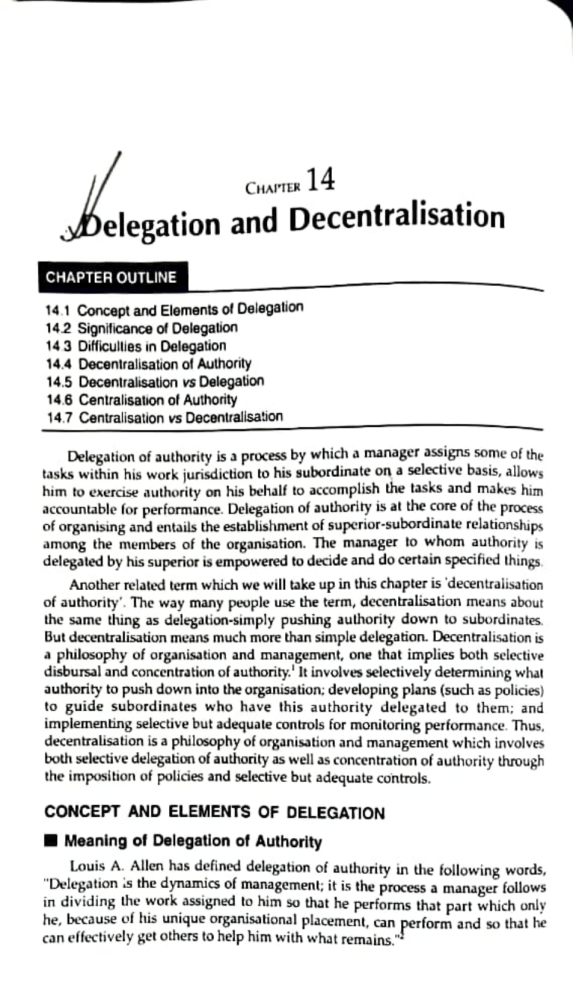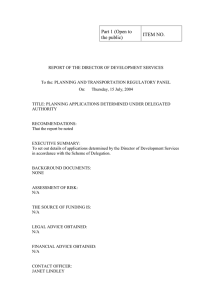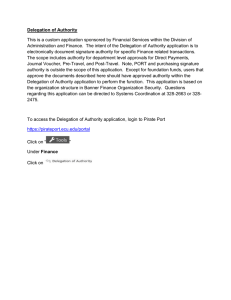
CHATEX 14 Delegation and Decentralisation CHAPTER OUTLINE 14.1 Concept and Elements of Delegalion 14.2 Signiticance of Delegation 143 14.4 Difficullies in Delegation Decentralisation ot Authoriy 14.5 Deceniralisation vs Delegation 14.6 Centralisation of Authority 14.7 Centrallsation vs Decentrallsalion Delegation of authority is a process by which a manager assigns some of the his subordinate within his work jurisdiction to tasks nm to exercise authority on his behalf on a selective basis, allows to accomplisn the tasks and makes him accountable for performance. Delegation of authority 1s at the core ot the process of organising and entails the establishment of superior-subordinate relationships among the members of the organisation. The manager lo whom authority is delegaled by his superior is empowered to decide and do certain specified ihings. Another related term which we will take up in this chapter is decentralisation use The about term, oftheauthoriy. way many people same thing as delegation-simply the decentralisation means pushing authority down to subordinates, much than sumple But decentralisation means more delegation. Lecentralisation is a phulosophy of organisation and management, one that implies both selective disbursal and concentration of authority:' It involves selectively determining what authority to push down into the organisation; developing plans (such as policies) to guide Subordinates who have this authority delegated to them; and implementing selective but adequate controls for monitoring performance. Thus, decentralisation is a philosophy of organisation and management which involves both selective delegation of authority as well as concentration of authority through the imposition of policies and selective but adequate controls. cONCEPT AND ELEMENTS OF DELEGATION Meaning of Delegation of Authority Louis A. Allen has defined delegation of authority in the following words, the dynamics of management; it the process a manager lollows is "Delegation in dividing he the worK assigned to him so that performs that part which only he, because of his unique organisational placement, can perform and so that ne s can elfechvely get otners to help him with what remains." ess by which an executive, land, "Delegation is that part of the organisn8 others to share the work of carrvin srator or a manager makes it possible n g duties, respoisihompany's purpose. It also includes the p he expects to a l a him in d o i n g the work e s a n d authority to those to whom k elegation of authority means the em the requisite auionty Unchribute their load of tons which they can functione assignment work accomplish othersa the job aoers the assigned. It enables work to manages others and on more perform better because of concentrate mp their in of to to position the on st share his burden? Firstly, he musten share his burden with others. How can he wst share huS Durdenristuy, ne must to others entrust the of work he would otnerwise have to do performance part he must himself; secondly, ans of checking upP the work that is done for proviae him to ensure that it is done as Delegation is the. nisation. a o means ne. Wishes. Elements in the Delegation authority involves three elements: of Assignment Responsibility. The superior entrusts some responsibilhty duty to subordinate for Granting of Authority. The performance. The p rocess () of delegation of or (i) Process of to a carry out the duty superior grants authority assigned. to the This may include subordinate right spend money, engage people, etc. (ii) Accountability tor Performance. The last step in delegation is concerned with creating an obligation to carry out duty or responsibility and render an account ot the results achieved through the use of delegated authority. The must subordinate granted to him. becomes to use resources, be held accountable for the exercise of By accepting the duties and authority, a subordinate responsible authority to his superior. Responsibility Responsibility denotes the work or duties assigned to a person by virtue of his position in the organisation. It refers to the mental and physical activities which must be performed to carry out a task or duty. That means every person who kind of mental or physical activities as an assigned task has performs some well, responsibility'. In order to enable the subordinate perform his responsibility of him. In other the superior must clearly tell the former as to what is expected words, the delegant must determine clearly the task or duty that is assigned to in terms the operations of a machine, the if he is asked to produce a certain number of duty is in terms of function. But terms of target or objective. Determination of of a product, the duty is in pieces what standards enable the subordinate to know by in terms of objectives will delegate. The duty must be expressed either of objectives. If a subordinate is asked to control the in terms of function or duies his performance will be evaluated. Authority Authority is the right granted to an employee to make possible the performance 30 Principles and Practice of lunagemen work assigned. Power to procure or use raw materidls, spend money, or a ask e n t of money, to hire snd fine peopke, ec. has to be delegated to individo nom the work is assigned. For instance, it the rlant Manager assigneo O Manager with the production of particular lype ot goods and seru.e ewill also grant hin the authority to use malerals, noney and machinery wOrkes and so on to fulfil the production schedule prescribed as his duty Accountability Accountability n teris ot is the obligation pertormance to carry out responsioty slandards established by the and hire exercise authon. superior. Creation accountability is the process of justitying the 8ranting ol duthority to a subordina for the accomplishment of particular task. standards In order a to nmake thus process eftectiv pertormance assigning a task and should be accepted by the subordinale. An important principie o 8overning this basic relationship is that ot single accountability. Anmanagement individ should be answerable to only one immediate superior and no more the should be determined belore of Accountability is logical derivative of authority. when a subordiante is given assignment and is granted the necessary authority to complete it, the final basic phase relationship holding the subordinate responsible organisation tor results. In other words, the an in is subordinate the assignment by the fair use Tesponsibility assigned. This, it can accountability moves upward. Can Both Authority Authority is the him to do the work and assigned. Sense ot task right or power granted effectively. The right That means, accountability assigned Responsibility authority or etc. has to be authority cannot be and exercise The extent of authority moves whereas Responsibility be Delegated? spend money, hire people, is an undertakes oDligation of authority and account tor the to complete discharge of be said hat downward can to an to ndividual to make procure poOssible for or to use raw materials, delegated to the persons to whom work be delegaled. But responsibility in the delegated. It is an obgation authority judiCiously. to carry out he accountability depends upon the extent of delegation of authority. accountability but he cannot cannot be delegate his delegated. responsibility A manager can job. He to do the delegate remains accountable for the results of the subordinates. The of the superior accountability tor acts of his subordinates is unconditional. Accountabilty moves upward because person is always accountable to the executive who to delegaled authority him. authority is downward. Accountabilty cannot be delegaled. Though it is incurred as a nesult of assignment duty and conferring of authority, accountability in itself cannot be delegated. On the other hand, the flow of of The delegant cannot abdicate responsibility. for that which the latter has delegated He remains accountable to his to him. Since superior accountability cannot be delegated, the accountability of persons higher in the hierarchy for the acts of the subordinates is unconditional. This can be illustrated by an example of three executives represening different levels of management. Ountap ana Co ion of his rminati This authority flows illustration also shows that accountable will upwara. lows hierarchy ot Types Tne be Subordinate to over h i m is his boss who organisation. of Delegation of ol Delegation 0 because of negligenceof duty. downward and accountabilty se Written authority Authority oral delegation. or writing, oral delegation of delegation, relained by Perferably authority must confusion and may create general (i) Delegation specific authority. or in misunderstanang. In of 8enea and spirit as case same form of work and authony delegated in the original officer. If only specific part the authority the situation be delegated different take the following forms under can is is delegated, it will be specific delegation. (iin) Soft has to level. this the delegatee of hard delegation is generally at lowe himself. This sort of delegation in do the work levels of management Soft delegation takes place at higher ot o t h e r with the help work to has perform delegation. In the and hard case the delegatee colleag es. (i) Lateral delegation. In this delegation the subordinate has to level. his colleagues of his o w n assume work with The subordinates themselves delegation. Informal without the (v) case Piease their help of superiors and use his authorities pertorm work just to any formal delegation. 14.2. SIGNIFICANCE OF DELEGATION U formal right to organisation's Delegation of authority down the chain of is passed partially command as vested in the topP management positions. creation of a hierarchy of managerial command in a graded m a n n e r by are vertically tied together through in the hierarchy positions All managerial created by the these relationships are and relationships authority-responsibility in the organisationn of authority. Each managerial position of delegation process and obligations which relationship responsibilities, of roles, is a cluster rights, to function in certain ways. demand the person occupying that position is a process by which the

